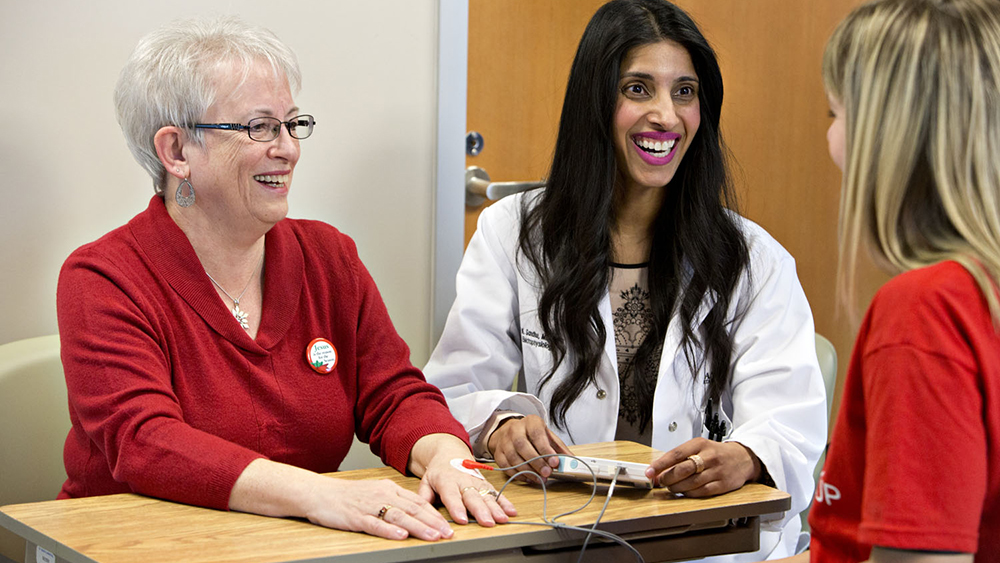
Retiree Dona Taverner, left, gets a heart-health check-up from Dr. Roopinder Sandhu and research co-ordinator Janis Baarda as part of the PIAAF-Pharmacy Study which seeks to identify Atrial Fibrillation (AF) in seniors as a strategy to prevent strokes. Photo credit: Jason Franson
"It was great, and it was quick," says the Fort Saskatchewan retiree. "I didn't have to have wires stuck all over me or disrobe, and they also checked my blood pressure and screened me for diabetes."
Just like Taverner, seniors are invited to participate in a two-city Canadian research study that gives them the opportunity to be screened at 10 Edmonton pharmacies for atrial fibrillation (AF), an abnormal heart rhythm that's a common and high risk factor for stroke.
The PIAAF-Pharmacy Study-a collaboration of Alberta Health Services (AHS), the Faculty of Medicine & Dentistry at the University of Alberta and the University Hospital Foundation, among others-seeks to identify more people with AF so they can receive guideline-recommended anticoagulant therapy in a bid to prevent strokes, deaths, disability and dementia.
To achieve this, 10 select pharmacies in Edmonton and 10 in Hamilton have received HeartCheck, a hand-held Canadian technology created by CardioComm Solutions, Inc. With it, seniors can now get an electrocardiogram (ECG)-a simple, painless test that records the heart's electrical activity - in the convenience and familiarity of a pharmacy setting.
If risk factors point to a need for changes in medication, the results of this monitoring can be sent directly to the participants' family doctors who can make a plan to improve their health.
"Atrial fibrillation is the most common abnormal heart rhythm that people can have and one devastating complication is stroke," says Dr. Roopinder Sandhu, an AHS cardiologist and assistant professor at the University of Alberta. "This is the first co-ordinated effort of community screening in Canada. By detecting the prevalence of atrial fibrillation and putting people on blood thinners, we can prevent strokes."
The study will screen 2,000 people, ages 65 years or older, for AF as well as hypertension and diabetes, two other common and treatable stroke risk factors.
Nearly 350,000 Canadians-including one-in-four seniors over age 75-have AF, which increases their risk of stroke by three to five times. It causes 15 per cent of the 50,000 strokes in Canada each year.
While some people with AF feel perfectly fine, others may experience symptoms such as irregular and fast heartbeat; palpitations or rapid thumping in their chest; chest pain or pressure; shortness of breath; fatigue; dizziness, sweating or nausea; and light-headedness or fainting.
"Pharmacies may well provide an ideal setting for community-based AF screening," says
Dr. Sandhu. "Patients with certain chronic diseases which predispose them to developing AF are estimated to visit their community pharmacists five times more often than other health care providers. Pharmacists are highly accessible, often the first point of entry into the health care system, and an essential link between patients and other health care providers."
To attend a session, seniors just need to be 65 or older and not on a blood thinner for AF. Screenings will continue until early next year.
Learn more with the complete list of participating pharmacies and session times.
Seniors can sign up in advance at participating pharmacies or drop in during scheduled sessions. The test takes 15 minutes to measure heart rhythm (ECG), blood pressure, diabetes risk, heart disease and stroke risk.
PIAAF-Pharmacy (The Program for the Identification of 'Actionable' Atrial Fibrillation in the Pharmacy Setting) is a Canadian Stroke Prevention Intervention Network study funded by the Canadian Institutes of Health Research and is also partnered with the Heart & Stroke Foundation; Rexall Pharmacies; McMaster University; CardioComm Solutions, Inc.; Boehringer Ingelheim pharmaceuticals; and the Cardiovascular Health Awareness Program.
Of her experience, Taverner says she felt relief after being screened for AF at a pharmacy as part of this study.
"I got a clean bill of health. I felt great, because at my age you never know," says the 66-year-old retiree. "For less than a half hour of my time, I got a lot of peace of mind as well as great education and awareness."
Seniors wanting a checkup can also call the PIAAF research co-ordinator at 780-492-1098.